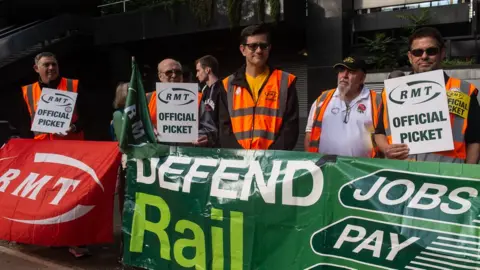RMT votes to end rail strikes until at least spring
 Getty Images
Getty ImagesRail workers have voted to accept a pay deal, ending their involvement in a long-running series of strikes.
Members of the RMT union agreed to an offer from 14 train companies, which included a backdated pay rise of 5% for 2022-23 as well as job security guarantees.
It means that RMT members will no longer be involved in industrial action until at least the spring of next year.
However, train drivers represented by the union Aslef will still strike.
Aslef members are to take part in a "rolling programme" of walkouts between 2 and 8 December, with different train companies affected on each day. Drivers will also refuse to work any overtime from 1 to 9 December, which will also cause disruption to timetables.
The RMT's agreement with train companies ends an 18-month row over pay, job security and conditions, but talks over future pay deals and working practices still remain.
The industrial action by both RMT and Aslef members have resulted in huge disruption on the country's railways, with trains being cancelled on strike days.
"Our members have spoken in huge numbers to accept this offer and I want to congratulate them on their steadfastness in this long industrial campaign," said Mick Lynch, RMT union's general secretary.
However, while RMT members, including workers such as train guards and signalling staff, will not strike in the coming months, a pay rise for the current financial year is still to be agreed and is dependent on changes to working practices.
The deal pushes talks into 2024 and Mr Lynch warned the union would "never shy away from vigorously defending our members' terms and conditions, now or in the future".
The government and industry have argued the rail industry needs to be reformed and is financially unsustainable.
'It's a start'
Jon, who is an RMT member, told the BBC the fact there were no changes to workers' terms and conditions was "the biggest win" for the union.
But he added: "Whilst I'm glad a deal has been done, it's not where we wanted to be.
"We would have preferred a larger pay increase, especially considering how long we've been in dispute for and how long it's been since we actually had a pay rise."
He said the pay deal was a "start" and provided "some respite between now and April when we can look at the negotiations for the 2023-24 year".
The Rail Delivery Group (RDG), which represents train companies, welcomed the RMT's vote, but warned passengers would still face disruption as a result of the train drivers' strikes.
"Instead of staging more damaging industrial action, we call on Aslef to work with us to resolve this dispute for the long-term good of everyone who works in rail and the millions of businesses and passengers who rely on it every day."
Transport Secretary Mark Harper said: "This is welcome news for passengers and a significant step towards resolving industrial disputes on the railway, giving workers a pay rise before Christmas and a pathway to delivering long overdue reforms."
He said the offer on the table for drivers could take a median salary from £60,000 to £65,000 for a four-day week, and urged the Aslef union to give their members a say on the offer. So far Aslef bosses have rejected the deal.
But Aslef's general secretary, Mick Whelan, said the union was "determined to win this dispute... and get a significant pay rise for train drivers who have not had an increase since 2019 while the cost of living, in that time, has soared.
"We are going on strike again, not to inconvenience passengers but to express our disgust at the intransigence of this government, and the bad faith shown by the private companies which employ us."
UK Hospitality, which represents hospitality businesses, has warned the driver strikes could hit its industry in the critical festive period, costing it up to £800m in losses.
A separate RMT dispute with Network Rail, which manages the UK's rail infrastructure, was resolved in March this year after signallers and maintenance workers voted to accept an offer.
Additional reporting by Kris Bramwell
